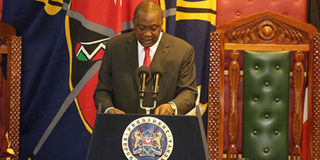Don’t relent in graft fight, lives depend on it!

President Uhuru Kenyatta delivers his State of the Nation address in Parliament on April 4, 2019. He framed the fight against corruption as a fight for the soul of our nation. PHOTO | FILE | NATION MEDIA GROUP
What you need to know:
- For the umpteenth time we shall urge the President to fire his cynical Cabinet and principal secretaries involved in acts of corruption.
- We urge him to empower the investigative agencies to carry out solid investigations and present concrete evidence to court in order to enable the Judiciary to do its job effectively.
In his State of the Nation address on Thursday, the President set himself the arduous task of delivering a future in which “the values of integrity, hard work and sacrifice must be reinstated and held dear in the eyes of our children”.
He indicated that there would be no turning back in the war against corruption and impunity, and that there would be no sacred cows and no compromise.
Rightfully, in my view, he framed the fight against corruption as a fight for the soul of our nation.
Today, I write to fully support the President’s sentiments, and to urge him, as we have done countless times before, to match these sentiments with action.
PUNISH OFFICIALS
The last time he made these declarations and even asked his senior officials implicated in corruption to “step aside”, we indicated that we would not be satisfied until there were actual convictions.
We indicated that we would prefer that implicated individuals either resigned from office or were fired, rather than being asked to take a fully paid indefinite holiday while public funds were used to finance their lifestyle.
For the umpteenth time we shall urge the President to fire his cynical Cabinet and principal secretaries involved in acts of corruption, and those that go to public forums to defend patently corrupt deals.
We urge him, in our name, to empower the investigative agencies to carry out solid investigations and present concrete evidence to court in order to enable the Judiciary to do its job effectively.
CULTURE
We urge him to focus on his mandate, and discourage his employees in the executive arm of government from covering up their failures by demanding that the courts use only public sentiment to convict, instead of the evidence tendered before our judges and magistrates.
This past week I was in Ghana and had a conversation with a long-time friend of mine on the evolution of African culture.
He told me that in his native tongue, the word for a person of European extraction, the equivalent of the Kiswahili Mzungu, translates as a trickster or con man.
He explained that this was derived from the fact that the first Europeans in the region tricked the indigenous population and their leaders, and managed to exploit them under the colonial system of government.
In a twist that encapsulates the problem with our people, the word today has acquired a very positive meaning and usage, and an African person is proud to be called this name that used to be derogatory in the local dialect.
SOCIALISED
The same phenomenon is now evident with the nomenclature we have chosen for crimes involving theft of public resources.
It would appear to me that many Kenyans today do not think corruption is a serious crime, and you will find them at street corners defending “one of their own” charged with or convicted of corruption-related crimes.
A few decades ago, being publicly associated with corruption was socially inappropriate, and no one could publicly argue that an individual associated with corruption should be left to go scot-free.
Perhaps we should revert these crimes to their original names – theft, mass murder, plunder, misuse of public funds, and so on.
This way people will hopefully appreciate the gravity of the crimes we are talking about, and agree that there should be no turning back!
Lukoye Atwoli is Associate Professor of Psychiatry and Dean, Moi University School of Medicine; [email protected]





